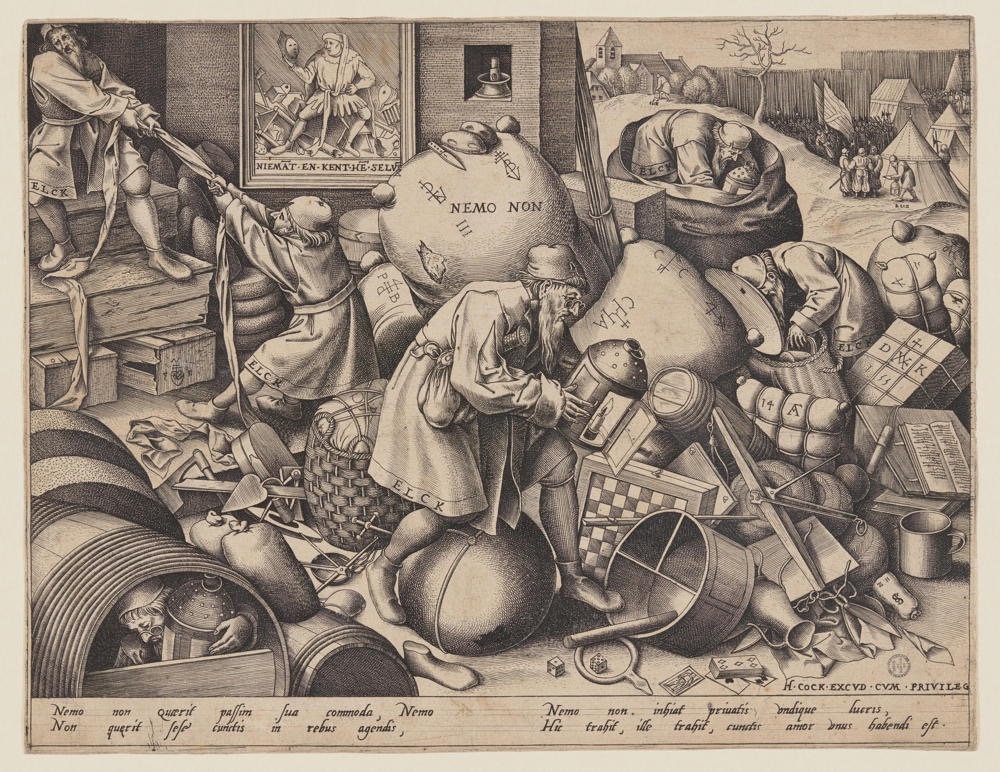RichLife

Pieter van der Heyden:
"Nemo Non” (Every man looks for his own profit) (c. 1563)
"I missed him before he left."
I received word that my dear friend Rich VanHorn died. He had been under hospice care since his physicians had released him from treatment two months before after eight months of effort to cure what started as a case of stage four lung cancer, which had migrated into his brain. He began treatment just as The Muse ended her immunotherapy response to early-stage throat cancer, with every expectation of a full recovery since he was an atypical patient. Never having smoked, the source of his cancer seemed mysterious, and he had access to one of the best clinics in the world. Initial responses seemed promising, but the cancer continued spreading until his doctors advised that he stop chasing a cure. He settled into that news with circumspection as if this phase of the disease had been sent to teach him something.
Rich took his undergraduate degree from Columbia Divinity, graduating into a position in the fabled Western Electric Human Resources Department in New Jersey. Western Electric was perhaps the preeminent HR operation at that time, spearheading the move toward what some called Welfare Capitalism, where employees were not treated as workers but as valued human beings. This management style would migrate into virtually every industry by the eighties, but it was still considered experimental in the late sixties. Rich imprinted on a manner of managing perfectly congruent with his Divinity degree. He was always more than a little bit the preacher when he taught and coached teams.
He enrolled at Stanford for graduate school and became a fixture of that rarest of neighborhoods for the following thirty years. He and his wife Elizabeth bought a three-bedroom Menlo Park rancher with a large yard a short walk from campus and raised their two kids there. At the same time, Rich worked as an HR Specialist and team coach at a Silicon Valley (before it was called Silicon Valley) pharmaceutical manufacturer. He was a part of that HR community as the Apples, Intels, and Sun Microsystems (later to become Google) took root and began adopting the innovative HR practices Rich had studied. He could be found most weekends trolling estate sales, looking for classic jazz recordings from the twenties, thirties, and forties to add to his extensive collection. He introduced me to the magic of Bix Beiderbecke's trumpet.
I met him when I joined a boutique Silicon Valley consulting firm in 1993. One of my partners introduced us over lunch in a restaurant Mental Research Institute scholar and wag Paul Watzlawick had labeled "biodeplorable." Rich and I hit it off for some reason, and he introduced me around. By then, he'd retired from his career to pursue what everyone in Silicon Valley eventually aspires to become: a consultant. He'd been coaching teams, and we collaborated on a couple of engagements and found our approaches compatible. We conspired to do more. He was interested in what he labeled Mindset Management® and I in Mastering Projects®. We shared insights. He began constructing a website that would share his perspectives, a construction he would not have finished when he departed, a life's work and then some his widow and son have sworn to carry on to finished.
He and Elizabeth sold their Menlo Park place for considerably more than the forty thousand dollars they'd paid for it and bought a hobby farm outside of Bend, Oregon. There, Rich played Green Acres, raising crops of oats to maintain the agricultural designation for tax purposes. He and Elizabeth attended many Sun Dances and similar Native American ceremonies through those years, Rich extending his interest in divinities. He continued constructing his website through several more iterations. Every time I saw him, he would have had another insight into how it should be completed. He'd started over innumerable times, but always with a certainty that he would one day succeed. He never lost his passion for his life's work. He lived a RichLife.
He seemed an endlessly hopeful and essentially timeless man. He didn't age. In some ways, he never really grew up, and why should he have? He and Elizabeth became snowbirds, buying a winter place in Tucson before finally selling the hobby farm and buying a much nicer neighboring place. They'd just finished remodeling it to their specifications when Rich received his diagnosis and entered the final human resource management experiment of his life. He always encouraged me to continue writing and even invited me to attend the Tucson Writer's Conference, though Covid blunted that intention. He and Elizabeth sold us their unneeded Lexis just as Covid was starting, and I flew down and drove it home all alone just before lockdown. We call that car Elizabeth, and I remember Rich every time I drive it. I missed him before he left. Now, I'm bereft but richer for it. I loved the man and the little boy inside him.
©2023 by David A. Schmaltz - all rights reserved


